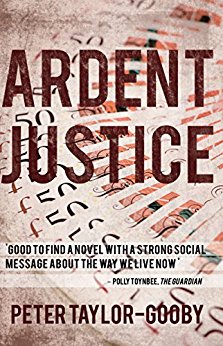I’m delighted that Peter Taylor-Gooby, author of Ardent Justice is returning to Linda’s Book Bag today. After the publication of his first novel, The Baby Auction, Peter previously wrote about dystopian fiction here.
I have my review of Peter’s latest novel, Ardent Justice, but also today Peter is explaining why he writes novels with a social conscience. Indeed, the profits from Ardent Justice will be going to support the housing and homeless charity Shelter.
Ardent Justice was published by Matador on 16th December and is available for purchase in e-book and paperback here.
Ardent Justice

Ade is a tax-inspector. She believes the money she raises pays for a decent NHS and adequate public services. She hates the City of London, the endless corruption, the bland assumption that tax is for the little people. She hates the casual sexism, the smug self-assurance, the inviolability of the men she deals with, and the cold certainty that nothing you can do will ever touch them.
She meets Paul, an Occupy activist who works with homeless people. As their love for each other grows, they find real fulfilment in fighting for the rights of ordinary people, such as Gemma, a homeless single parent. Then she has a chance to do something of permanent value, but at great cost to her own integrity.
Writing Novels with a Social Conscience
A Guest Post by Peter Taylor-Gooby
From Dickens’ Bleak House, to Orwell’s Coming Up for Air to Zadie Smith’s White Teeth, there are plenty of great novels that deal with social issues. But why do they succeed as novels? A novel with a social conscience sounds a bit of a contradiction in terms. Surely novels are about imagination, fun, engagement, building characters and seeing what they do; social conscience is about analysing the facts: who’s bad and who’s good, who suffers and who gains.
Novels start out from a problem or a situation and expand outwards. They take the reader somewhere that they didn’t expect to go. Reading them you learn more, about the world and other people, but also about yourself. Social conscience narrows down. It takes a part of the world and scrutinizes it. It deals in social facts. Somehow it’s confining not liberating.
My day job is as a social scientist and I wanted to write novels to find a different way of thinking about the social issues I study. As you might imagine, I started with the issues I wanted to talk about and thought that the problem in writing a novel was to find a way to dramatize it. I was interested in the issue discussed in my academic text Reframing Social Citizenship of how market society erodes trust between people. The modernisation and privatisation of many aspects of our lives has generated a huge increase in resources, but there is evidence that as the market takes over more and more of our lives and our relationships we tend to become less caring, less empathetic and more individualist.
Through writing my first novel The Baby Auction I came to understand how limited my ideas about novel-writing were. The whole point about novels is that they work through character. I created a group of people and laid down the pathways on which they were supposed to travel to make the plot work. I was amazed and frustrated to discover that they developed minds of their own. My characters got out of control and did things I didn’t expect and certainly didn’t intend and the whole thing had to be rewritten three times, each time taking more of myself out and putting more of the characters in.
Novels are about characters, about people and people don’t always do what they’re told. To put it pompously, people have free will. Just as we don’t know everything about our friends (or even our children) and what they are going to do, we don’t know what characters we’ve created will turn out. I’m sure everyone else who reads this blog knows this already, but for me it was a discovery, slightly scary but immensely liberating.
My new novel Ardent Justice is set in the world of tax-cheating financiers and street homeless people who live cheek by jowl in the City of London – the wealthiest square mile in the world, a city within a city with its own local government and its own police force. But the novel is not directly about greed and poverty or about scams and parasites or about how the wealthy manage their affairs and keep them well away from the rest of us out.
It’s about Ade the tax-inspector, who hates her job, who hates the city fat-cats she has to deal with every day and who’s frightened by what she sees on the street if she has to walk home late from the office. It’s about her life and how hard it is for her to live it, and how she does. Ade came to me from somewhere, I don’t know where, and I started writing about her and her struggles and triumphs and disappointments and that’s the story.
I’m sure that at one level it’s a novel with a conscience. It has things to say about how people live in our world and how they ought to live and how they should treat each other, but it’s not a novel with a message and it’s far distant from what I do in my day job. First and foremost it’s about people and about what they do. I find it exciting to be able to approach issues I think about analytically in a completely different way. I got a lot out of writing the book. I hope you enjoy it.
My Review of Ardent Justice
Ade audits big business accounts, but when she encounters Webster, her life is dramatically changed.
What a thought provoking read Ardent Justice is, especially as, by the end, I’m not convinced justice has really been severed morally. I’ve been thinking hard about the issues raised and have had to reassess my own views about society as a result. In Ade’s place I’m still not sure what I would do and some of my assumptions about what is morally right have been challenged by reading Ardent Justice. One response that reading Ardent Justice raised in me quite acutely was a feeling of ignorance. I wondered just how much of the story could really be happening right under our noses. Truth is, after all, stranger than fiction.
Whist potential readers may feel they will be getting a somewhat dry read in a book described as having a ‘strong social message’, they would be wrong. Certainly there are uncomfortable themes of abuse, corruption at all levels and violent behaviour, but these are all presented within dramatic scenes, in a well plotted narrative and offset by friendship and romance so that there is much to enjoy as a very entertaining story too. The sociological aspects are well blended in the narrative so I didn’t feel I was being preached to.
I only had one small issue with the characterisation. With Ade’s education and position in the city, occasionally I found her grammar incongruous. However, this may well have been deliberate with Ade modulating her language better to fit in with those around her. I found Ade feisty and convincing otherwise.
Peter Taylor-Gooby’s style is a pleasure to read. He manages to balance complex compound sentences that build description or Ade’s thoughts, for example, with simple phrases that add a drama that almost startles the reader. There’s a poetic feel in some of the phrasing too and I really enjoyed this aspect. I thought the appeal to the reader’s senses was especially good.
Part thriller, part sociological tract, Ardent Justice is, above all else, a really good story and an entertaining read.
About Peter Taylor-Gooby

When he’s not writing Peter enjoys hill-walking, riding his bike, holidays and looking after his grand-daughter (not in that order). Peter became interested in social policy issues after working on adventure playgrounds, teaching, claiming benefits and working in a social security office in Newcastle. He has worked in the UK, most European countries, Canada, the US, China, Korea and Japan, Australia and South Africa.
You can follow Peter on Twitter. Peter will also be speaking at Malvern Science and Faith Weekend and tickets for that event are available here.


This books sounds excellent, Linda. A must read for me as I am also in that world and deal with the world of London corporate finance frequently.
LikeLiked by 1 person
Oh! Well I hope you don’t meet characters like some of these!
LikeLike
This is my book for today, so looking forward to it especial after reading your blog today.
LikeLiked by 1 person
Hope you enjoy it too!
LikeLiked by 1 person
Reblogged this on Don Massenzio's Blog and commented:
Check out the book, Ardent Justice, by Peter Taylor Goodby, via Linda’s Book Bag blog.
LikeLiked by 1 person
This sounds like a brilliant read! Wonderful post!
LikeLiked by 1 person
Thanks Donna – very good of you to drop by and comment.
LikeLiked by 1 person